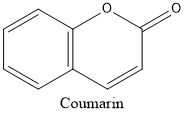A 5-minute Tour of the Coumarin Family
Coumarins are a group of natural products that are widely distributed in nature and have important biological activities such as anti-inflammatory, anti-edema, anti-cancer, anti-tumour and immune enhancing, anti-oxidant, scavenging excess oxygen free radicals and protecting liver cells.
What are the members of the coumarins?

1. Simple coumarins: Coumarins that have only substituents on the benzene ring.
The main substituents of the simple coumarins are -OH, -OCH3, -CH3, -CHO, etc. Their pharmacological action is related to the type, position and number of substituents on their parent nucleus. For example, simple coumarins have anti-tumour effects by acting on the cell cycle, inducing apoptosis, various signalling pathways and influencing the GST/NQO system to inhibit the proliferation of tumour cells. It also acts as an antibacterial agent by inhibiting DNA topoisomerase and DNA rotase. In addition, simple coumarins have anticoagulant and anti-radiation effects.
2. Furocoumarins: The isopentene group on the nucleus of coumarins is often combined with the neighbouring phenolic hydroxyl (7-hydroxy) ring to form a furan or pyran ring, the former being called furanocoumarins.
The furanocoumarins consist of antioxidant, anti-inflammatory, analgesic, anti-allergic, anti-bacterial, anti-arrhythmic and other medicinal effects. In addition, furanocoumarins inhibit the activity of enzymes that break down drugs, thus affecting the metabolism of the drug.
3. Pyranocoumarins: The C-6 or C-8 isopentene group of coumarins is cycled with the o-phenolic hydroxyl group to form the 2,2-dimethyl-alpha-pyran ring structure, forming pyranocoumarins.
The basic structure of pyranocoumarins is the lactone ring (carbon ring containing oxygen) and the benzene ring (C6H6), which is the component found in coumarins by man. It smells like vanilla and almonds and is therefore a common flavouring in the confectionery industry. The best known coumarin lactone in pyranocoumarins comes mainly from the zero-ring coumarin. It smells like sweets, cakes and biscuits, has relaxing and hypnotic properties, and promotes blood circulation and lymphatic flow.
4. Bicoumarins: Bicoumarins, also called bicoumarin, alfalfa phenol and defeated warfarin, have high medicinal value. Bicoumarins are clinically classified as anticoagulants and are coumarins, which are orally administered.
Bicoumarins are used clinically to combat thrombosis and embolic phlebitis and can treat various thromboembolic diseases. Its anticoagulation mechanism is the same as that of warfarin.
Chemenu provides a wide variety of organic compounds and offers exclusive development for advanced intermediates. We manufacture building blocks, intermediates and novel compounds. Please send us a message if you need to get the quote.
What are the members of the coumarins?

1. Simple coumarins: Coumarins that have only substituents on the benzene ring.
The main substituents of the simple coumarins are -OH, -OCH3, -CH3, -CHO, etc. Their pharmacological action is related to the type, position and number of substituents on their parent nucleus. For example, simple coumarins have anti-tumour effects by acting on the cell cycle, inducing apoptosis, various signalling pathways and influencing the GST/NQO system to inhibit the proliferation of tumour cells. It also acts as an antibacterial agent by inhibiting DNA topoisomerase and DNA rotase. In addition, simple coumarins have anticoagulant and anti-radiation effects.
2. Furocoumarins: The isopentene group on the nucleus of coumarins is often combined with the neighbouring phenolic hydroxyl (7-hydroxy) ring to form a furan or pyran ring, the former being called furanocoumarins.
The furanocoumarins consist of antioxidant, anti-inflammatory, analgesic, anti-allergic, anti-bacterial, anti-arrhythmic and other medicinal effects. In addition, furanocoumarins inhibit the activity of enzymes that break down drugs, thus affecting the metabolism of the drug.
3. Pyranocoumarins: The C-6 or C-8 isopentene group of coumarins is cycled with the o-phenolic hydroxyl group to form the 2,2-dimethyl-alpha-pyran ring structure, forming pyranocoumarins.
The basic structure of pyranocoumarins is the lactone ring (carbon ring containing oxygen) and the benzene ring (C6H6), which is the component found in coumarins by man. It smells like vanilla and almonds and is therefore a common flavouring in the confectionery industry. The best known coumarin lactone in pyranocoumarins comes mainly from the zero-ring coumarin. It smells like sweets, cakes and biscuits, has relaxing and hypnotic properties, and promotes blood circulation and lymphatic flow.
4. Bicoumarins: Bicoumarins, also called bicoumarin, alfalfa phenol and defeated warfarin, have high medicinal value. Bicoumarins are clinically classified as anticoagulants and are coumarins, which are orally administered.
Bicoumarins are used clinically to combat thrombosis and embolic phlebitis and can treat various thromboembolic diseases. Its anticoagulation mechanism is the same as that of warfarin.
Chemenu provides a wide variety of organic compounds and offers exclusive development for advanced intermediates. We manufacture building blocks, intermediates and novel compounds. Please send us a message if you need to get the quote.
评论
发表评论